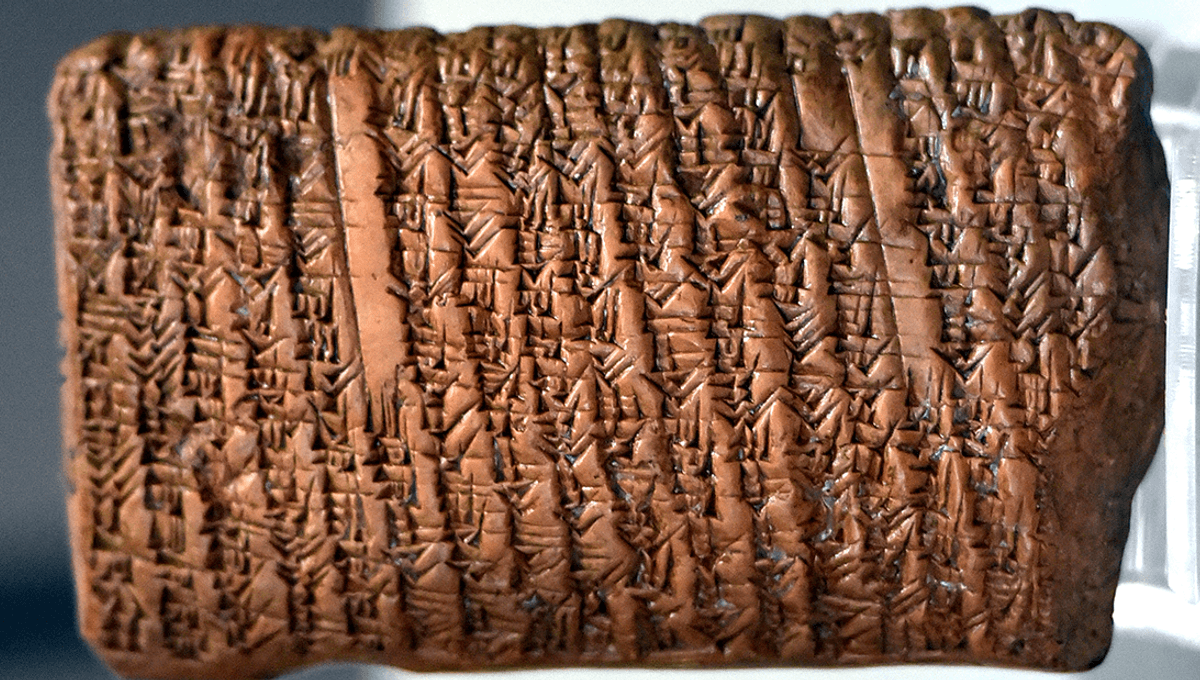Study math for long enough and you will likely have cursed Pythagoras’s name, or said “praise be to Pythagoras” if you’re a bit of a fan of triangles.
But while Pythagoras was an important historical figure in the development of mathematics, he did not figure out the equation most associated with him (a2 + b2 = c2). In fact, there is an ancient Babylonian tablet (by the catchy name of IM 67118) which uses the Pythagorean theorem to solve the length of a diagonal inside a rectangle. The tablet, likely used for teaching, dates from 1770 BCE – centuries before Pythagoras was born in around 570 BCE.



Will any of our writings be found in 2500 years? Are we a myth…?
It seems to be a case similar to Socrates, or Jesus. Nice how Pythagoras was supposed to perform miracles, and stay a month “dead” just to later come back to life.
The year is 5123. We have meticulously deciphered texts from the early 21st century, providing us with a wealth of knowledge. Yet one question still eludes us to this day:
Who the heck is Magic 8. Ball?
The media on which our electronic data is stored have lifespans measured in just years. Everything that the Internet consists of right now, unless it’s endlessly copied forward, will be lost.
There’s a copy of Wikipedia on the moon and the orbiting Tesla. With a shelf live of a few billion years.
Luckily the moon is a quick day-trip away in case we return to sticks and stones.
The point being it’s for a humanity that recovered scientific progress in a place techno-barbarians cant ruin or, failing that, others 👽
Unless you’re a contemporary, you’ll just be a story.
I thought Jesus was a proven historical figure, because we have some independent Roman info about him.
Sort of. Tacitus, for example, mentions his execution a hundred years later but his cult was relatively popular, spreading throughout the Jewish diaspora, having a notable presence in Rome itself, and presumably played a part in a massive rebellion in Judaea. Of course, a lot of the Roman sources could also be fabricated references, but Tacitus’s is considered reliable.
There isn’t a document saying “Pilate had this dude executed today” but there are sources saying “That dude Pilate executed back in the day has a cult and they’re being annoying.”
So yes, there almost certainty was a cult leader that was executed and his followers believed he was divine, or at least started saying he was within a couple decades of his death, but we, for example, don’t even have a primary source that his name was Yeshua. We mostly know for certain that people worshipped a guy named Yeshua a century after his probable death.
But history is funny, and cults are weird.
It’s not impossible, for example, a man with a cult named something too “ethnic” for Greeks and Romans to pronounce was stabbed by a Roman by the side of the road. They scatter and start telling everyone about how a soldier of Pilate martyred their God, it becomes a crucifixion over time where a soldier stabs him in the side, and everyone gives up on correcting people that his name wasn’t “Josh” and just rolls with it because at least they’re getting the “Christ” title right.
But we don’t have a source for that version, so you can broadly assume a dude named Jesus was baptized by John, crucified by Pilate, and these were reliable events even if everything else isn’t.
That’s a beautiful answer, thanks!